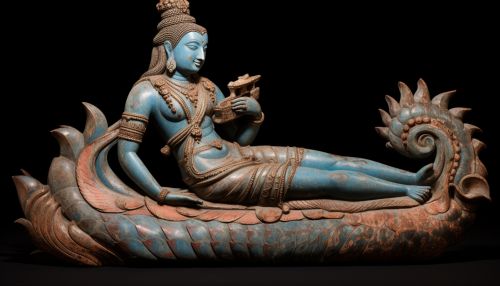Vishnu
Overview
Vishnu is one of the primary deities in the Hindu pantheon. He is known as the preserver and protector of the universe, a role which contrasts with those of the other two members of the Hindu Trimurti, Brahma the creator and Shiva the destroyer. Vishnu is often depicted as a blue-skinned being who rests on the cosmic serpent Ananta, with his consort Lakshmi massaging his feet. He is also known for his ten avatars, which he assumes whenever the world is threatened by evil forces.


Etymology and Other Names
The name Vishnu is derived from the Sanskrit root 'vish', which means 'to pervade'. This is in line with his role as the preserver, as he is believed to pervade the entire universe. Vishnu is also known by many other names, including Narayana, Vasudeva, and Hari. The Vishnu Sahasranama, a list of 1,000 names for Vishnu, is a testament to the many attributes and qualities ascribed to this deity.
Iconography
Vishnu is typically depicted as a four-armed, blue-skinned male deity. In his four hands, he usually holds a conch shell (shankha), a discus (chakra), a lotus flower (padma), and a mace (gada). Each of these items has symbolic significance in Hinduism. The conch shell, for example, represents the primal sound of creation, while the discus symbolizes the mind.
Avatars of Vishnu
Vishnu is known for his ten avatars, or incarnations, known as the Dashavatara. These avatars are believed to have been taken by Vishnu to restore dharma (righteousness) whenever it was threatened by adharma (unrighteousness). The ten avatars are: Matsya (the fish), Kurma (the tortoise), Varaha (the boar), Narasimha (the man-lion), Vamana (the dwarf), Parashurama (the warrior with an axe), Rama (the prince and king of Ayodhya), Krishna (the cowherd and philosopher), Buddha (the enlightened one), and Kalki (the future avatar).
Worship and Festivals
Vishnu is widely worshipped across India and in Hindu communities around the world. Many temples are dedicated to him and his various avatars, especially Rama and Krishna. Some of the major festivals associated with Vishnu include Vishu, a new year festival celebrated in Kerala; Vaikuntha Ekadashi, a festival observed in the month of Margazhi; and Janmashtami, which marks the birth of Krishna.
Philosophical Interpretations
Vishnu's role as the preserver of the universe has been interpreted in various ways in different philosophical schools of Hinduism. For instance, in the Vedanta school, Vishnu is considered the ultimate reality or Brahman, while in the Vaishnava tradition, he is viewed as a personal god who can be approached through devotion (bhakti).
